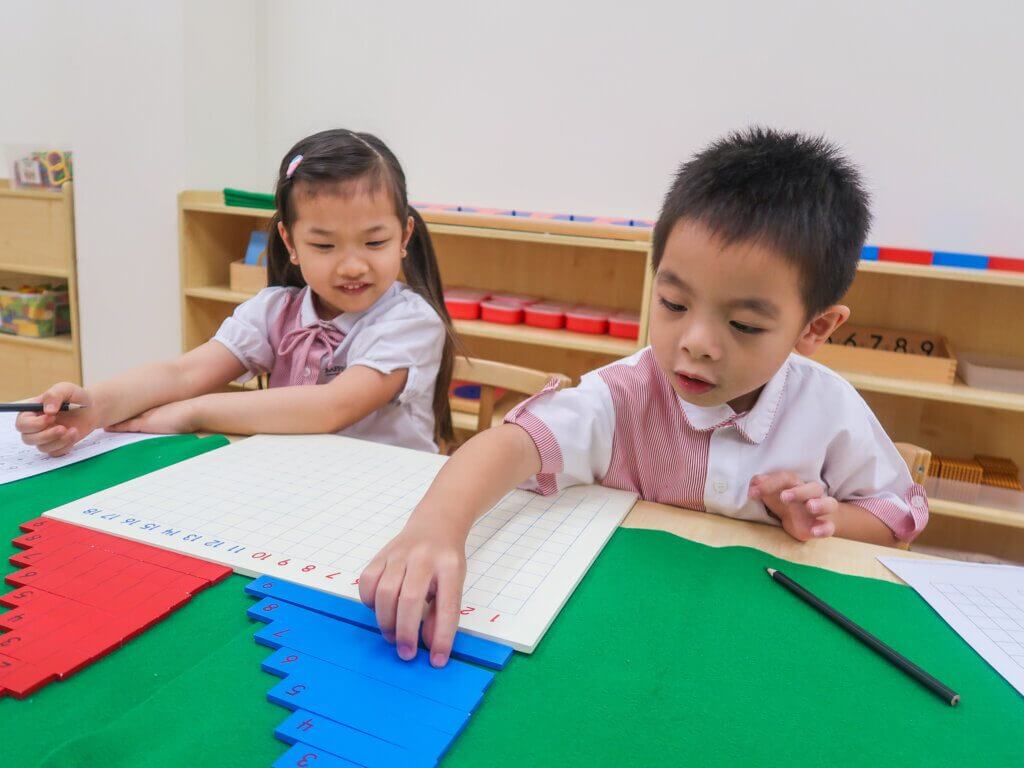All parents want their children to receive the best education that builds a solid academic foundation. Even at a young age, what they learn at school can have a profound and lasting impact on their development and learning capacity.
Montessori is a well-established method of teaching that has remained at the forefront of early childhood education since its establishment more than a hundred years ago. Developed by Dr Maria Montessori, it has been able to stay relevant and ground-breaking despite its early origins. The method takes a child-focused approach to education where they are in charge of their learning. Independence is not just allowed but encouraged.
Many qualities encouraged through Montessori’s education are comparable to the attributes parents want to see in their children; confidence in themselves, competence, empathy, and productivity. With this method, instilling these values begins early in their lives as preschool ages are the crucial period for setting the foundation for their future endeavours.
With a Montessori education, children are capable of growing into self-sufficient, intelligent, and determined individuals who flourish as adults. Here are some benefits of Montessori education:
1. Hands-on learning
In a Montessori classroom, all objects and activities have their own precise shelves and locations. Creating a nurturing and accessible setting is of utmost importance, as children lead their own learning through the use of developmentally appropriate learning aids. Children will engage in various sensorial explorations through everyday interactions in the classroom. The materials provided also allow them to directly classify the world around them. For example, incorporating concrete objects explicitly enables children to discover complex ideas and comprehend sophisticated words better.
The best part about a Montessori setting is that it enables students to grow, develop, and learn at their own pace. Children are exposed to classes, activities, and materials that enhance their skill set and aid them as they make personal development progress. Along with more conventional academic learning, these autonomously utilised tools give children the chance to improve their coordination and focus.
2. Progressive and personalised education
Students advance at their own pace when their input is valued above all else and in classrooms where learning activities are offered individually. Depending on their interests and talents, they are given the opportunity to practice, review, or advance in what they want during their learning. They become responsible for their education and can take control early on.
Teachers regularly evaluate their students in a Montessori environment according to their observations of how each child interacts with their surroundings and classmates. They create a stimulating setting that is simultaneously intellectually, physically, socially, and emotionally responsive to a child’s needs by using their expertise in children’s development and academic achievements. Based on each child’s particular talents and abilities, they then create a personalised learning plan for them.
The teachers facilitate environments where students are allowed to seek solutions to their queries and are given the resources to do so, training them on how to do it independently.
Self-correction and self-evaluation are crucial components of the Montessori classroom strategy. As they get older, students learn to examine their work objectively and get better at identifying, fixing, and learning from their mistakes.
3. Social interaction
Another advantage of Montessori education is the emphasis on social skills development. On top of the priority of providing children with academic excellence, a Montessori environment paves the way for children to enhance their social interaction with their peers and teachers. Teachers treat students with respect and treat them as adults who have opinions and views that are valued.
In a typical classroom, you will often find students spread out in different areas and engaged in a task. This is also known as their ‘workspace’. Teachers will remind students to respect each other’s workspace to allow all students the time and focus needed to complete a certain activity. When working in groups, children will learn how to collaborate effectively and help each other out. Through the nature of the classroom setting, children will learn to respect each other and develop the skills for problem-solving while also building trust and friendship among their peers.
Conclusion
Montessori education aims to create a comprehensive learning environment that allows children to be equipped with the skills necessary to solve problems independently and creatively. Through hands-on learning and a strong emphasis on respectful communication, students will be nurtured into lifelong learners.
Adopting the Montessori and inquiry-based approach, Raffles Kidz provides a holistic curriculum that allows children to take the lead in their own learning and fulfil their best potential. Find out more about our multi-award-winning curriculum and why we are one of the best full-day childcare in Singapore! Book a tour or contact us today.


